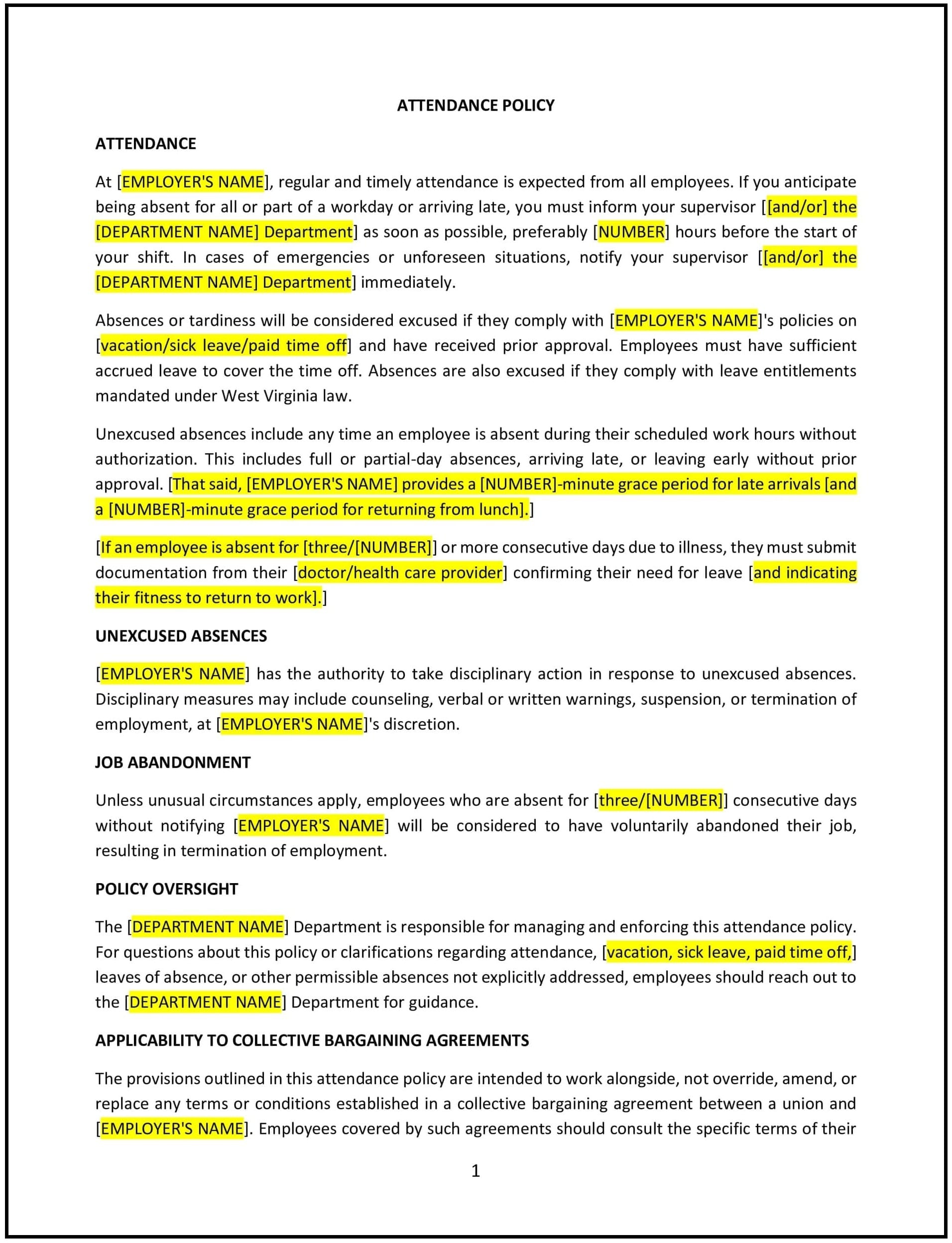Got contracts to review? While you're here for policies, let Cobrief make contract review effortless—start your free review now.

Customize this template for free
Attendance policy (West Virginia)
An attendance policy helps West Virginia businesses set clear expectations for employee attendance, punctuality, and time-off requests. This policy outlines the procedures for requesting time off, the consequences for excessive absenteeism or tardiness, and the company’s approach to managing attendance to ensure operational efficiency.
By implementing this policy, businesses can maintain a productive workforce, minimize disruptions, and foster a fair and consistent approach to attendance management.
How to use this attendance policy (West Virginia)
- Define attendance expectations: Clearly outline the company’s expectations for employee attendance, including the required work hours, punctuality, and any flexibility offered (e.g., remote work options or flexible hours).
- Set guidelines for requesting time off: Establish procedures for requesting planned time off (e.g., vacations, personal days) and unplanned absences (e.g., illness), including the notice period required and how requests should be submitted (e.g., via email, online system).
- Address tardiness: Specify how tardiness will be handled, including the maximum allowable grace period and the consequences for repeated late arrivals.
- Manage excessive absenteeism: Define what constitutes excessive absenteeism and outline the steps that will be taken if attendance becomes a problem, including warnings, meetings with management, or potential disciplinary actions.
- Provide accommodations: Address how requests for accommodations (e.g., for disability or medical reasons) will be handled, ensuring compliance with applicable laws like the Americans with Disabilities Act (ADA).
- Track attendance: Implement a system for monitoring and tracking employee attendance, including how records will be maintained and reviewed.
- Ensure fairness and consistency: Ensure that the policy is applied consistently to all employees and that attendance issues are addressed in a fair and transparent manner.
Benefits of using this attendance policy (West Virginia)
This policy offers several benefits for West Virginia businesses:
- Promotes fairness: Provides a clear framework for managing attendance, ensuring that all employees are held to the same standards and that attendance issues are handled consistently.
- Improves productivity: Clear attendance expectations and efficient tracking help maintain operational efficiency and minimize disruptions caused by absenteeism.
- Reduces absenteeism: By setting clear expectations and addressing absenteeism early, businesses can reduce unplanned absences and the associated costs.
- Enhances employee accountability: Employees are more likely to take their attendance responsibilities seriously when they understand the consequences of excessive absenteeism or tardiness.
- Improves compliance: Helps businesses comply with relevant state and federal regulations regarding employee leave and accommodations, such as the Family and Medical Leave Act (FMLA).
Tips for using this attendance policy (West Virginia)
- Communicate the policy clearly: Ensure that all employees understand the attendance expectations, the procedures for requesting time off, and the consequences for non-compliance.
- Monitor attendance regularly: Track attendance consistently to identify patterns and address issues proactively before they become major problems.
- Provide reasonable flexibility: Where possible, offer flexible scheduling or remote work options to accommodate employees’ needs while maintaining productivity.
- Address attendance issues promptly: If attendance problems arise, address them as soon as possible to prevent further disruption and maintain fairness.
- Review periodically: Regularly review the policy to ensure it remains relevant, effective, and in compliance with changes in West Virginia laws or company practices.